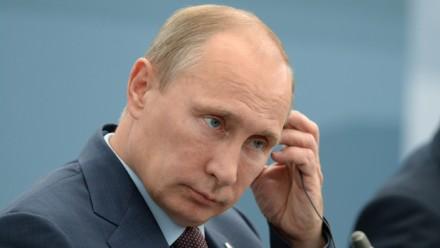Syria: Cameron furious at Putin spokesman's 'small island' jibe

President Obama isolated in push for Syria strike as Russia taunts PM over humiliating defeat in Commons
DEEP divisions between leaders at the G20 summit descended into acrimony last night when a senior Russian official dismissed the UK as "just a small island no one pays any attention to."
Dmitry Peskov, the Russian president's official spokesman, allegedly made the remark as he told Russian journalists that the UK was irrelevant in terms of its global influence. To emphasise his point he reportedly joked about Russian oligarchs buying up large parts of Chelsea and other upmarket London districts.
The Daily Mail says Russia - a staunch ally of the Assad regime - has been "revelling" in David Cameron's humiliating defeat in the Commons last month over British participation in a US-lead intervention in Syria. The Kremlin's decision to "rub Mr Cameron's nose in it" - with the Prime Minister on Russian soil - will plunge Anglo-Russian relations to a new low, the paper says.
The incident also "underlined the Cold War style tensions" that have been uncovered by the Syria crisis.
Russian officials last night denied Peskov had made the inflammatory remarks, but the British PM appeared to accept they were genuine. He angrily rejected the dismissal of British influence saying, "I don't accept that for a moment, the Daily Telegraph reports.
Cameron argued that Britain had saved Europe from fascism, abolished slavery and "invented most of the things worth inventing". He said the country's art, sport, literature, diplomacy, philosophy, music, economy and military put it among the great nations of the world, the Daily Mails reports.
Here is a round-up of the other key developments:
G20 leaders divided over Syria: As the G20 summit enters its final day, there is no consensus on an international response to the use of chemical weapons in Syria. The BBC says it is "curious" that President Putin's spokesman suggested the G20 was "split down the middle" over Syria, because opponents of a strike seem to far outnumber supporters. Indeed the US and France are the only nations in St Petersburg who have committed to using force against the Assad regime. The "increasing isolation" of President Obama over Syria will satisfy Putin, the BBC's Steve Rosenberg says. The Russian leader is vehemently opposed to a military intervention and "from what world leaders have said over the last 24 hours, he will assume Moscow's message has been getting through".
Obama making "little headway" in Congress: It is almost a week since the US president began his campaign to convince Congress to give a US strike on Syria the go-ahead and progress is slow, says the Washington Post. Obama has "achieved little headway against a wall of scepticism on Capitol Hill", the paper says. Despite support from several high-profile Democrats and Republicans, the two parties are "splintered on the issue". To make matters worse, many members of Congress say they are hearing "virtually no support for an attack from their constituents." Both houses are expected to vote on the issue next week.
UK pledges extra £52 million aid for Syrian refugees: David Cameron has promised an extra £52 million of British aid to help the estimated two million people who have fled Syria's bloody civil war. Chairing a humanitarian meeting at the G20 summit, the British PM urged other leaders to meet UN appeals for £900 million for Syria and £1.9bn for neighbouring countries this year.
Blair blames Iraq war for ‘hesitation' over Syria intervention: The Labour PM told the BBC that the protracted nature of the war in Iraq had swayed MPs who voted against a Commons motion paving the way for an intervention in Syria. Blair "played down" the influence of the failure to find weapons of mass destruction in Iraq on the Commons vote. He conceded that Iraq had shown that interventions can be "very difficult", but said Syria, left unchecked, could become a potent source of extremists.
Source: The Week
